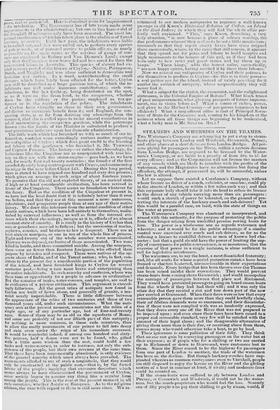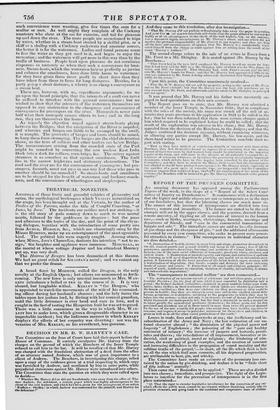STEAMERS AND WHERRIES ON THE THAMES.
THE Watermen's Company are attempfibg to put a stop to steamboats plying between London anti Woolwich, Greenwich, Putney, and other places at a short distance from London Bridge. All per sons plying for passengers on the River, within a certain distance from London Bridge, are required to be licensed by the Water men's Company, or are liable to a penalty of from 40s. to 51. for every offence; and as the Corporation will not license the masters of any vessels which are likely to interfere with the profits of the watermen, and the Magistrates have no alternative but fining the offimders, the attempt, if persevered in, will be successful, unless the law is altered.
Let us suppose there existed a Coachmen's Company, without whose licence no driver of a coach, cabriolet, or omnibus, could ply in the streets of London, or within a few miles each way ; and that this corporate body should take it into its head to refuse its licence to thedriver of any vehicle carrying more than six passengers : would such a stretch of power be tolerated, on the ground of protecting the interests of the hackney-coach and cab-drivers? Yet this would be a parallel case, on land, with the state of things on the water at present.
The Watermen's Company was chartered or incorporated, and armed with this authority, for the purpose of protecting the public from the danger arising from unskilful persons rowing boats for hire. The power is a wholesome one as regards watermen and wherries; and it would be for the public advantage if a similar control were exercised over coach and cab drivers, so far as the refusing a licence to unskilful drivers or men of known bad character: but that a guild should have the power of limiting the supply of conveyances for public convenience, is so monstrous, that the exercise of that power in a single instance, is alone sullicient to call for legislative interference.
The watermen are, to say the least, a most dissatisfied fraternity; and, like all crafts for whose especial protection statutes have been framed or charters bestowed, unconscionable in their expectations and demands. Every bridge that has been thrown over the Thames has been raised amidst their execrations. They would prevent steam-boats from coming above Greenwich ; and would monopolize the carriage of passengers between that place and Richmond. They would have prevented passengers going on board steam-boats from the wharfs if they had had their will; and it was only the other day that they created a riot and tore down part of the new pier erected at Gravesend. When their fares were so low that every reasonable person gave them more than they could lawfully claim, their ad libitum demands were so enormous, and their dissatisfaction if these were not complied with was so insolently expressed, that they drove every one off the River that was not prepared to be imposed upon ; and even since their fares have been raised to a proper and reasonable standard, very few will be satisfied with the amount of their legal claim; and the disagreeable alternative of giving them more than is their due, or receiving abuse from them, causes many who would otherwise take a boat, to go by land. Their ignorance is some palliation of their folly. They think that no one can gain by conveying passengers on the water but at their expense; as if people who for a shilling or two are carried up to Richmond or down to Gravesend, were customers lost to them. Since the River ceased to be the highway for passengers From one part of London to another, the trade of the watermen has been on the decline. But though hackney-coaches have supplanted wherries as common conveyances even to Vauxhall, people are still disposed to enjoy the breeze on the River and the gliding motion of a boat in summer at least, if civility and moderate fares could be counted on.
If the steam-boats were suffered to ply between London and Putney, or Greenwich and Woolwich, it would not be the water
men, but the coach-proprietors who would feel the loss. Scarcely one of fifty people who pay their shilling to go by steam, would, if
such convenience were wanting, give five times the sum for a sculler or oars. As well might they complain of the Cockney amateurs who slave at the oar for exercise, and toil for pleasure up and down the river. The more people are accustomed to trips by water, whether in a steam-boat steered by a skilful pilot, or a skiff or a shallop with a Cockney cockswain and amateur rowers, the better it is for the watermen. Ladies and timid persons cease to fear the water as they get used to it, and begin to enjoy the reel-cation; and the watermen will get more in this way than by the traffic of business. People bent upon pleasure do not scrutinize sixpences so narrowly as when they seek a conveyance for business. Steam-boats, which the watermen hate as perfectly as jarvies and cabmen the omnibuses, have done little harm to watermen; for they have given them more profit in short fares than they have taken from them in fares for long distances. Besides, for a party going a short distance, a wherry is as cheap a conveyance as a stea -beat.
These are, however, with us, superfluous arguments; for we go upon the broad principle, that the interests of a craft can never be suffered to interfere with the general convenience : but we -wished to show that the interests of the watermen themselves are opposed to any obstruction to the cheapness and convenience of conveyances for passengers on the river. Monopolists never gain half what their monopoly causes others to lose; and in the long run, they are themselves the losers.
As regards the objection urged against steam-boats plying between the Bridges, that the navigation of the River is impeded, and wherries and barges are liable to be swamped by the swell, it is naught. The gunwales of barges and boats should be raised, to keep them from swamping. The barges are the chief obstruction above, as the tiers of colliers and other traders are below Bridge. The inconvenience arising from the crowded state of the Pool might be remedied by converting the now useless East India Dock into a dock tar colliers, corn-brigs, &c. The outcry against steamers is as senseless as that against omnibuses. The fault lies in the narrow highways and stationary obstructions. The road and the river are Ihr the convenience of passengers; but passengers, forsooth, must not pass in one way lest those who pass in another should be inc,immoded So steam-boats and omnibuses are to be stopped for the benefit of watermen and hackney-coachmen, and the convenience of wharfingers and shopkeepers.





















 Previous page
Previous page